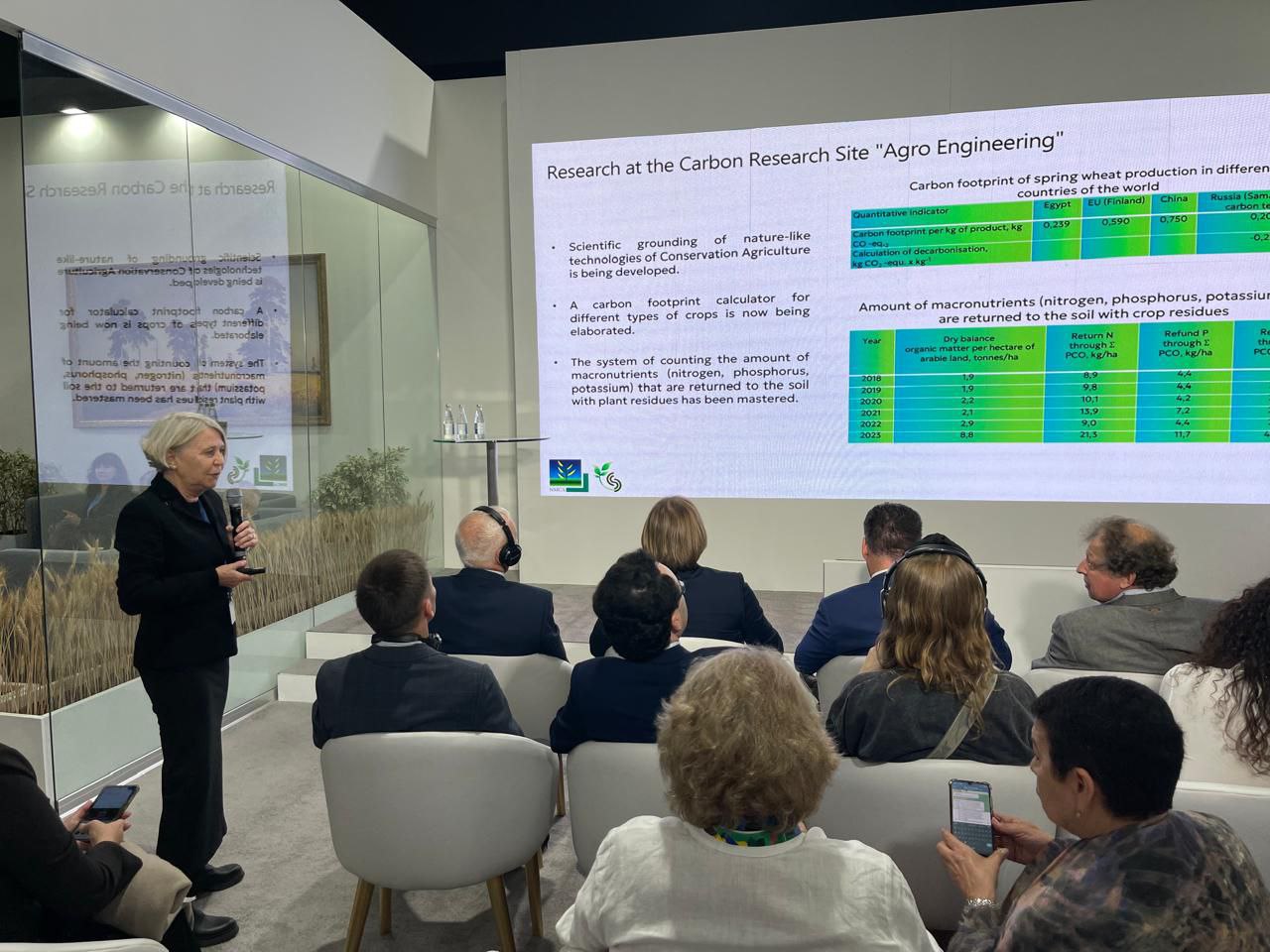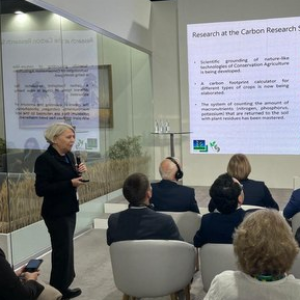Today, November 22, the COP29 climate conference, the main global event in the field of approval of climatic obligations and prevention of climate change consequences, ends in Baku. Employees of Scientific Research Laboratory of climate studies of Samara National Research University took part in the work of this forum. The results of research obtained in the Agricultural carbon landfill “Agro Engineering” operated by the university were presented to the international community.
On November 12, the Ministry of Science and Higher Education of Russia held the conference “Science Day”: Natural and Climate Solutions and Climate Problems of the Caspian Region”. Ludmila Orlova, the President of National Movement of Conservation Agriculture, Senior Researcher at the Scientific Research Laboratory of climate studies performed with the report on work of the first in Russia agricultural carbon landfill “Agro Engineering” (the Samara Region).
She brought the goals of the project to the attention of the international experts. Comprehensive studies of processes of depositing of soil organic carbon and greenhouse gas emissions are carried out, the most accurate and cost-effective methods of their assessment are developed at the landfill.
Research on the efficient management of carbon cycle and photosynthesis using technologies of soil conservation and resource-saving agriculture is also being conducted here. The positive effect which is expressed in the increase of soil fertility, cropping capacity and quality of agricultural products, and also in prevention of erosion, degradation and desertification of soils at the landfill is reached through the use of biological methods.

Ludmila Orlova presented the results of work of the agricultural carbon landfill “Agro Engineering”.
In particular, the scientists compared greenhouse gas emission at fields with traditional cultivation and with no-till soil protection technology. Portable gas chromatographs developed by Samara University were used for this purpose (this equipment is included into the State Register of Measuring Instruments). The first experiments on calibration and determination of carbon content in soil using hyperspectral camera were also carried out.
Scientists developed software capable of distinguishing of soil from plant residues based on data obtained and carrying out of analysis of soil for organic carbon content during survey by unmanned air drone, and also of processing hyperspectral data taking into account the whole research complex held at the carbon landfill, namely: performing microelement analysis, greenhouse gas runoff analysis, microbiological analysis.
Ludmila Orlova presented new method of soil samples collection to the expert community. Samara scientists executed analysis of more than 200 soil samples (dropping at 15 media in aerobic, anaerobic, microaerophilic conditions). 7,364 strains representing 1,352 species of 324 genera were identified.
Carbon footprint of plant products of carbon landfill was determined. The report includes: crop carbon footprint calculator developed by the industrial partner and system of calculation of quantity of macroelements (nitrogen, phosphorus, potassium) which return to the soil with plant residues.
Ludmila Orlova stated that within the framework of the climate project of the experimental farm “Orlovka Agro Innovation Center”, the industrial partner of the landfill, the total validated climate effect equal to 40,924 tons annualized in CO2-equivalent was obtained.
Also within the framework of the Agricultural carbon landfill “Agro Engineering” project international cooperation with BRICS+ countries is being established. The key goal is to create Agricultural Alliance which will solve the problems of soils conservation and their fertility, provide functioning of the unified market of carbon units, support unified methodology for determination of soil carbon, validation and verification of climate projects.
The international community remarked high level of research held at Samara agricultural carbon landfill, as well as compliance of the climate project implemented in 2024 with the nature-based solutions. Urgency of problems solved within the framework of the project was underlined.
Experts of the International Emissions Trading Association (IETA) notice that agritechnologies restoring the soil along with reforestation technologies are the most effective natural solutions for reducing of greenhouse gas emissions and carbon capture. According to the World Bank, natural solutions can contribute to achievement of 37% of short-term global goals set by Paris Climate Agreement and to sustainable development.
For reference:
Events of the conference “Science Day: Natural and Climate Solutions and Climate Problems of the Caspian Region” arranged by the Ministry of Education and Science at COP29 UN Climate Conference:
· Expert session “Natural climate solutions for mitigation and adaptation to climate change”;
· Meeting of the Expert Council on carbon landfills;
· Expert session “The Caspian Region in light of climate change”.
 RU
RU  EN
EN  CN
CN  ES
ES 